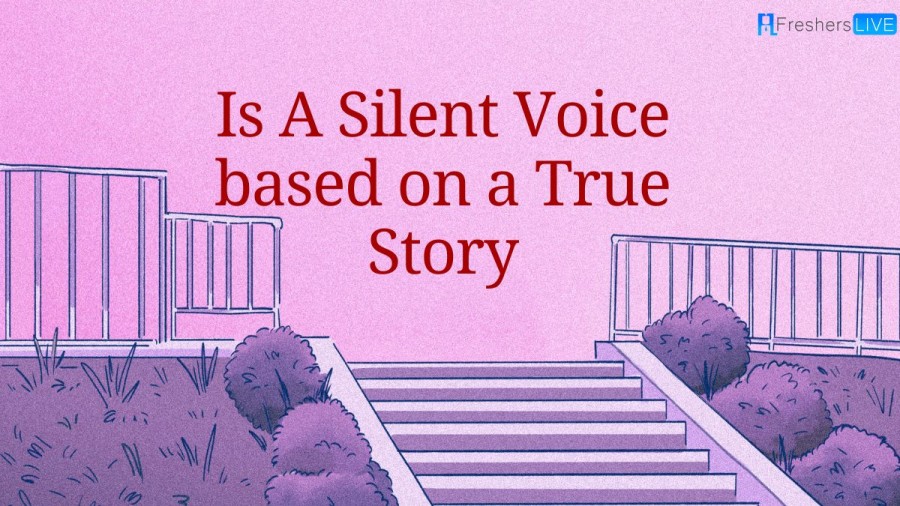Is A Silent Voice based on a True Story? Silent Voice Ending Explained
by Rohit
Updated Mar 10, 2023

Is A Silent Voice based on a True Story?
No, "The Silent Voice" is not based on a true story. It is a work of fiction created by the author and illustrator, Yoshitoki Ōima. While the story deals with important social issues and disabilities, it is not based on any specific real-life events or individuals.
Fans on various social media platforms have recently been buzzing about A Silent Voice. It is a 2016 Japanese animated film that portrays two protagonists, Shoya Ishida and Shoko Nishimiya.
Hope the answer for “Is the silent voice based on a true story or not?”has been cleared in the above section.
A Silent Voice Real Story
The Silent Voice (also known as "Koe no Katachi" in Japanese) is a manga series written and illustrated by Yoshitoki Ōima. The series was first serialized in the Weekly Shōnen Magazine from August 2013 to November 2014, and later published as a complete volume by Kodansha in September 2014.
The story follows a young boy named Shoya Ishida, who in his elementary school days bullied a deaf girl named Shoko Nishimiya. The story then explores the themes of redemption, forgiveness, and communication as the two characters cross paths again in high school. The manga became very popular and received critical acclaim for its sensitive portrayal of social issues and disabilities.
The manga was later adapted into a successful anime film directed by Naoko Yamada, which was released in Japan in 2016.
A Silent Voice Review
The Silent Voice" is a powerful and emotionally resonant anime film that tackles important themes of redemption, forgiveness, and the challenges faced by those with disabilities. The story is both heartbreaking and hopeful, and the characters are deeply compelling and well-developed.
One of the film's strengths is its sensitive portrayal of Shoko Nishimiya, the deaf girl who is the target of bullying. The filmmakers take care to accurately represent the challenges faced by people with hearing impairments, and to explore the ways in which those challenges can be exacerbated by bullying and social isolation. Shoko is a complex and sympathetic character, and her interactions with Shoya and the other characters are a highlight of the film.
Another strength of the film is its exploration of the complex dynamics of bullying, both from the perspective of the bully and the victim. The film does not shy away from depicting the ugliness of bullying, but it also acknowledges that those who engage in bullying are often struggling with their own pain and insecurities.
Overall, "The Silent Voice" is a poignant and thought-provoking film that delivers a powerful message about the importance of empathy, forgiveness, and understanding. It is a must-watch for anyone interested in exploring the complexities of human relationships and the challenges faced by those with disabilities.
A Silent Voice Themes
"The Silent Voice" deals with several themes that are explored throughout the film. Some of the key themes include:
- Bullying: The film explores the impact of bullying on both the victim and the bully, and the long-lasting effects it can have on people's lives. It also highlights the importance of recognizing and addressing bullying behaviour.
- Disability: The film sensitively portrays the challenges faced by people with disabilities, particularly those with hearing impairments. It shows how society often marginalizes people with disabilities, and the importance of breaking down barriers and promoting inclusion.
- Redemption: The film explores the idea of redemption, and the possibility of making amends for past mistakes. It shows how people can learn from their mistakes and work towards becoming better versions of themselves.
- Forgiveness: The film emphasizes the importance of forgiveness, both for oneself and for others. It shows how holding onto grudges and resentment can prevent people from moving forward and finding peace.
- Communication: The film highlights the importance of communication, both verbal and nonverbal. It shows how misunderstandings can arise when people are unable to communicate effectively, and how learning to understand and appreciate different forms of communication can bring people together.
Silent Voice Ending Explained
The ending of "The Silent Voice" is open to interpretation, but it can be interpreted as a message of hope and redemption.
Towards the end of the film, Shoko and Shoya finally reconcile after a long and difficult journey. They both come to terms with their past mistakes and find forgiveness in each other. Shoko invites Shoya to go on a walk with her and they hold hands, symbolizing a deep connection and trust between them. This scene is particularly powerful because throughout the film, Shoya has been struggling with guilt and self-loathing for his past actions towards Shoko, and this moment represents a step towards self-forgiveness.
The ending also shows Shoya's growth as a person. He begins to form new relationships with his classmates, who previously shunned him due to his past behavior. He becomes more comfortable with his own identity and learns to appreciate the people around him. In the final scene, Shoya and his friends light fireworks together, symbolizing a celebration of life and the possibility of a brighter future.
Is a Silent Voice based on a True Story- FAQ's
No, "The Silent Voice" is a work of fiction created by the author and illustrator, Yoshitoki Ōima.
The title "The Silent Voice" refers to Shoko's struggle to communicate with others due to her deafness, as well as the importance of listening to and understanding those who may be marginalized or ignored.
The film is rated PG-13 for mature thematic elements including bullying, some disturbing images, and language.
"The Silent Voice" is available for streaming on several platforms, including Netflix, Hulu, and Amazon Prime Video.
The running time of "The Silent Voice" is approximately 2 hours and 10 minutes







